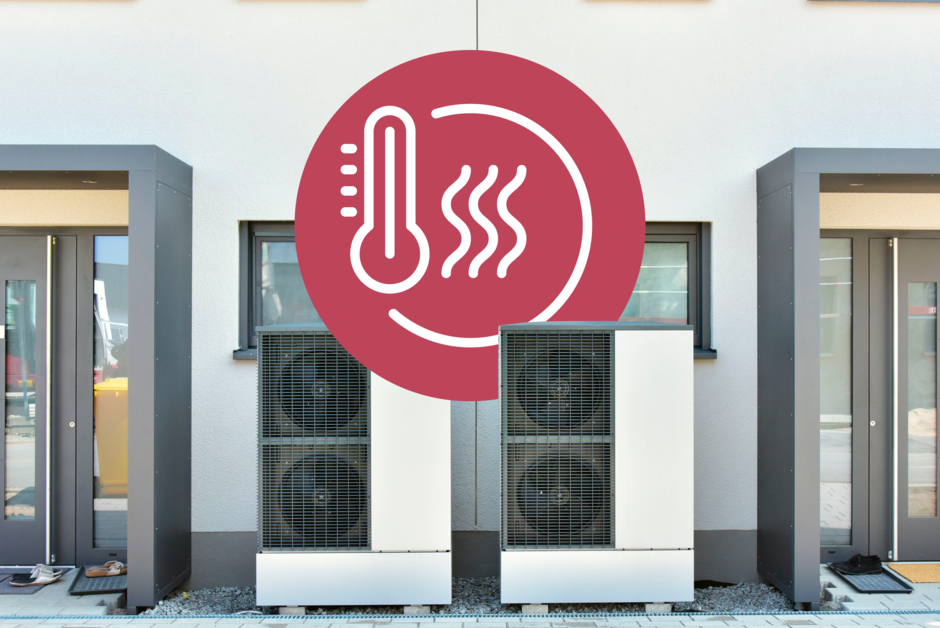Innovation area II
Heat pump technology for building energy supply
The innovation area focuses on a novel heat pump technology: integrative and intelligent heat pump modules are being developed and investigated, optionally employing oil-free components and/or components from automotive thermal management. These compact heat pump modules will feature standardized connections for power supply and control, as well as quick-release couplings for the hydraulic connection of the heat sink and heat source.

Sub-project II.1
Integration of compact HP modules into building energy systems
Five relevant application cases for the compact heat pump (HP) modules are defined based on different building and heating system typologies. For these identified deployment scenarios, a systematic evaluation and selection of suitable low-temperature heat sources is conducted. In the TRNSYS simulation environment, different building typologies are applied to illustrate the interactions (supply variants and integrations) with the HP module under development.
Combination concepts involving multiple HP modules are developed. The integration of these HP modules into building energy systems is studied, including the incorporation of PV systems and storage systems. Social science aspects, such as acceptance and adoption of the technology, are analyzed and evaluated through interviews.
Researchers
Franziska Bockelmann
siz energieplus
Sub-project II.2
Model-based design and optimization of compact HP modules
The project partners define the requirements for compact HP modules for the identified application scenarios. The Institute for Thermodynamics (ift) uses the Modelica-TIL library to design the modules, investigates various options, and selects suitable solutions for components, refrigerants, and control strategies.
Special attention is given to CO₂ high-voltage compressors and oil-free turbo compressors. Prototypes of the modules will be designed for measurements on a specially constructed system test bench. The control of the test bench is developed based on models.
The validated models serve to optimize the configuration, components, and control concepts of the HP modules.
Researchers
Dr. Wilhelm Tegethoff
TU Braunschweig
Sub-project II.3
Construction and experimental investigation of compact HP modules
The ift constructs the planned system test bench described in sub-project II.2, complete with measurement, control, and regulation (MSR) technology, and continuously integrates the HP module prototypes. A partial system for using air as the heat source is built and commissioned, including safety technology for flammable refrigerants. The HP modules and their components are measured for validation and energy analysis.
Various refrigerants and compressor types are tested, also in conjunction with the IMAB’s power electronics (sub-project II.4). The MSR is enhanced with AI methods to detect faults and optimize operating strategies. Two compact modules with standardized connections are manufactured and tested in the field.
Hardware-in-the-loop tests using the system simulation from sub-project II.1 are conducted to validate operating strategies, particularly defrosting strategies and the prevention of icing when air is used as the heat source.
Researchers
Dr. Nicholas Lemke
TU Braunschweig
Sub-project II.4
Design, construction, and investigation of power electronics for electrical integration
At the start of the project, the requirements for the electrical energy supply - such as voltage levels, power range, and connection to the public grid - are coordinated with the other project partners.
Concepts for PFC (Power Factor Correction) and rectifiers are optimized through circuit simulations to minimize losses and ensure power quality. GaN power semiconductors are considered for DC/DC converters due to their efficiency, although challenges related to cooling and EMC (electromagnetic compatibility) exist.
Lifetime assessments are based on the usage scenarios from sub-project II.1, supported by modeling and experimental tests in the power electronics laboratory.
Researchers
Prof. Dr.-Ing. Regine Mallwitz
TU Braunschweig
Sub-project II.5
Design, implementation, and investigation of AI-based methods for system analysis, operational optimization, and fault detection
Development of strategies for identifying overall system factors and typical faults in HP systems.
The goal is an AI-based control unit to optimize the operational strategy and detect faults in the building energy system and refrigeration cycle. User inputs and training data for the AI-based control unit are defined. In a series of experiments on the system test bench with the compact HP modules from sub-project II.2, AI-based methods for system analysis, operational strategy optimization, and fault detection are evaluated and demonstrated experimentally.
Researchers
Maximilian Loth
Institut für Solarenergieforschung in Hameln (ISFH)